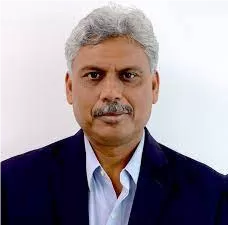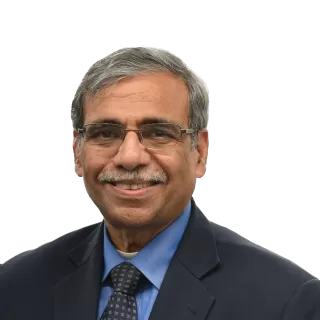Certified Senior Leader in Buying & Merchandising
In order to stay relevant in the market not just the retail-stock should be updated but also so should be the human resource of a shop floor. Mr. Srikant Gokhale, former group CEO, Landmark Group, Dubai and lecturer of marketing, University of California, Berkeley taught the participants from various Reliance outfits and brands that today’s fundamental for the progress of a business is positive cashflow as against profits. He explained how today’s business economy runs on the concept of a positive cash flow from lenders, and investors while the concept of mandatory profits to survive is turning obsolete.
Further Mr. Gokhale cited how it is important to manage vendors, well negotiate the contracts and maintaining their performance in regards with quality and pace. Further he explained that it is necessary to anticipate risk and mitigate it with apt measures. Mr Gokhale as well advised to include diligent offboarding procedures to ensure a smooth end of vendor relationship.
The participants who hailed from various verticals and subsidiaries of Reliance across Mumbai presented, discussed and resolved their key problems and had multifaceted interactions in the sessions.
A key takeaway from Mr. Gokhale’s exegesis was that a rigid SOP could ruin the success of a project. While citing “What got you here, wouldn’t get you there”, Mr. Gokhale iterated that having a stricture of a formula many a time is a deterrent to moulding into the requirements of a new market or customer requirements. Fresh environments require fresh perspectives.
On the second day of the session, Dr. Dipak Jain, Vice-Chancellor talked about developing a winning mindset. He asked the participants to imbibe in them leadership traits like the ability to anticipate, the courage to deal with ambiguity and the power to develop adaptability.
Dr Jain explained while knowledge comes from analysis, wisdom arrives from connecting the dots. He further mentioned that a retail personnel should follow the new trends or organic food, slow food and slow fashion to be adept in consumer wellness and cater to the populace with earning power.
Further Mr. Srikant Gokhale explicated case studies on Star Bucks and Luckin Coffee and explained how Star Bucks lost to Luckin Coffee in China due to negligence over competition. He then quoted the author Philip Kotler and advised all to have a vision catering to five years in future.
The sessions that were meant to answer the participants’ questions on various issues around retail and other streams, concluded in an overall satiating experience for all.
Mode: In-person at Ulwe Campus
Upcoming Sessions
Overview of Reliance Retail:
Reliance Retail, a subsidiary of Reliance Industries Limited, is India’s largest retailer, revolutionizing the country’s retail landscape through a wide range of formats and offerings. Established in 2006, the company operates across diverse segments, including food and groceries, consumer electronics, fashion, lifestyle, and pharmacy. Its commitment to innovation and customer-centric strategies has made it a market leader with a widespread presence in both urban and rural areas.
The company’s expansive portfolio includes well-known brands such as Reliance Fresh, Reliance Digital, and Reliance Trends, catering to diverse customer needs. Additionally, Reliance Retail has strengthened its e-commerce presence through JioMart, a digital platform that integrates online and offline retail experiences. Leveraging its vast supply chain infrastructure and technology, Reliance Retail ensures seamless delivery and superior customer service.
With a strong focus on inclusivity, Reliance Retail supports local communities by sourcing from small and medium enterprises, farmers, and artisans, fostering economic growth at grassroots levels. The company has also entered into strategic partnerships with global brands to enhance its offerings and expand its footprint.
Reliance Retail continues to drive innovation and transformation in India’s retail sector, playing a pivotal role in shaping consumer behavior and contributing significantly to the nation’s economy.
Programme Schedule:
The programme schedule for the Executive Education Programme at Jio Institute offered a comprehensive blend of expert-led sessions, interactive discussions, and case studies to address contemporary challenges in retail. On the first day, Mr. Srikant Gokhale, former Group CEO of Landmark Group and lecturer at the University of California, Berkeley, focused on essential concepts like the importance of positive cash flow over traditional profit-driven models. He emphasized vendor management, risk mitigation, and the necessity of adaptability in dynamic market conditions. His sessions highlighted that rigid standard operating procedures can hinder success and stressed the need for fresh perspectives to meet evolving market demands.
The second day featured Dr. Dipak Jain, Vice-Chancellor who discussed developing a winning mindset through anticipation, adaptability, and navigating ambiguity. He elaborated on the role of connecting insights for wisdom and staying ahead of consumer trends, such as organic food and slow fashion, to cater to emerging customer demands.
The programme also included case studies, such as Starbucks' challenges in China, to demonstrate the importance of strategic foresight and competition awareness. The two-day event provided participants with actionable insights and leadership strategies, fostering a deeper understanding of retail complexities.
Here are some key benefits of the programme
- Enhanced Cash Flow Management: Emphasis on maintaining positive cash flow over profits.
- Effective Vendor Management: Insights into managing vendor relationships, negotiating contracts, and implementing offboarding procedures.
- Leadership Development: Encouragement to develop traits like anticipation, adaptability, and dealing with ambiguity.
- Adaptability to Market Changes: Importance of avoiding rigid SOPs and adopting fresh perspectives.
- Trend Awareness: Staying updated with trends like organic food, slow fashion, and consumer wellness.
- Strategic Visioning: Guidance on having a five-year vision for business growth.
- Problem-Solving: Opportunities for participants to discuss and resolve key issues.
- Case Study Analysis: Learning from real-world business scenarios like Starbucks and Luckin Coffee.
- These benefits collectively aim to enhance business strategies and overall operational efficiency.
Learning Outcomes
The Executive Education programme yielded a variety of learning outcomes
Strategic Thinking and Adaptability
The programme emphasized the importance of strategic thinking and adaptability in leadership, equipping participants to navigate complex and dynamic business environments. Sessions led by Mr. Srikant Gokhale highlighted the shift from profit-driven models to cash flow-based strategies, underscoring the need to anticipate market risks and mitigate them effectively. Participants learned to analyze vendor relationships, negotiate contracts, and implement offboarding processes, ensuring seamless operations. The programme stressed that rigid adherence to standard operating procedures can impede innovation, encouraging leaders to adopt flexible approaches tailored to new markets and customer needs. By integrating case studies like Starbucks' competitive challenges in China, the sessions demonstrated how strategic foresight and adaptability are crucial for sustaining long-term business success.
Leadership and Consumer-Centric Approaches
Participants gained valuable insights into leadership traits necessary for fostering innovation and maintaining relevance in retail. Dr. Dipak Jain's sessions focused on developing a winning mindset, emphasizing anticipation, ambiguity management, and adaptability as core leadership attributes. Leaders were encouraged to connect analytical insights to broader trends, fostering wisdom in decision-making. The programme also explored the growing significance of consumer wellness, urging retail professionals to align with trends like organic food and slow fashion to meet evolving consumer preferences. By integrating these strategies, participants enhanced their ability to anticipate and respond to customer needs, solidifying their roles as forward-thinking, consumer-centric leaders. This learning outcome prepared attendees to drive organizational growth while maintaining a human-centric focus.
Programme Synopsis
Day 1: Strategic Thinking and Adaptability
1. Introduction to Strategic Thinking:
- Definition and importance of strategic thinking in personal and professional contexts
- Key components: vision, mission, goals, and objectives
- Techniques for developing a strategic mindset
2. Analysis and Decision-Making:
- Tools for strategic analysis: SWOT, PESTLE, and competitor analysis
- Decision-making frameworks: Rational decision-making, intuitive thinking, and creative problem-solving
- Case studies of strategic decision-making in real-world scenarios
3. Adaptability Skills:
- Understanding the concept of adaptability and its relevance in a dynamic environment
- Techniques to enhance personal adaptability: Growth mindset, resilience, and flexibility
- Adapting to change: Strategies for managing change in organizations and personal life
4. Practical Applications and Exercises:
- Simulation exercises and role-playing scenarios to practice strategic thinking and adaptability
- Group discussions and workshops to brainstorm and solve strategic challenges
- Reflection and feedback sessions to evaluate strategic thinking processes and adaptability skills
Day 2: Leadership and Consumer-Centric Approaches
1. Fundamentals of Leadership:
- Definition and importance of leadership in various contexts
- Different leadership styles: Transformational, transactional, servant leadership, etc
- Key leadership skills: Communication, empathy, decision-making, and influence
2. Understanding Consumer Behavior:
- The significance of consumer behavior in shaping business strategies
- Key factors influencing consumer decisions: Psychological, social, and cultural
- Techniques for gathering and analyzing consumer insights: Surveys, focus groups, and data analytics
3. Developing Consumer-Centric Strategies:
- Principles of a consumer-centric approach: Customer satisfaction, loyalty, and engagement
- Strategies for creating a consumer-centric culture within organizations
- Tools and techniques for designing consumer-centric products and services
4. Practical Implementation and Case Studies:
- Real-world examples of successful consumer-centric strategies and leadership approaches
- Group activities and simulations to apply leadership and consumer-centric concepts
- Reflective exercises to assess and improve personal leadership and consumer-centric skills


